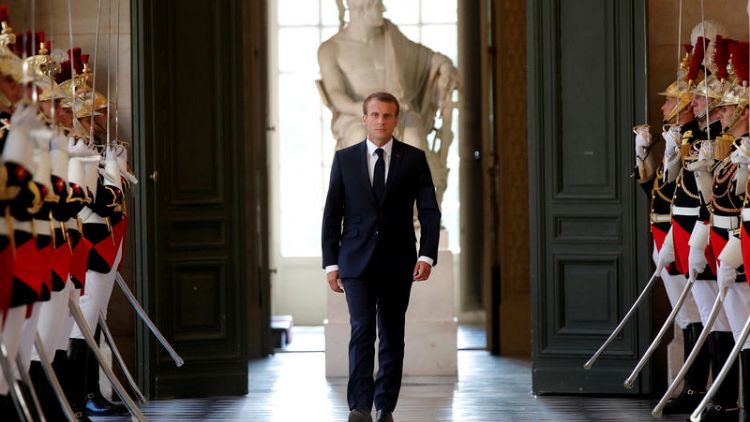By Michel Rose
PARIS (Reuters) - French business morale fell to its lowest since Emmanuel Macron became president in May 2017, suggesting an uncertain global trade outlook and higher oil prices may be offsetting the feelgood bounce generated by his election.
Sentiment soared after Macron arrived in the Elysee Palace promising investor-friendly reforms and a return to fiscal discipline, hitting a multi-year high of 111.5 in December.
The composite business morale index dropped to 106 by July and slipped further to 105 in August, statistics institute INSEE said on Thursday.
The latest reading remains above the long-term average of 100 however and, unlike a drop in French consumer confidence that can be attributed to discontent about higher taxes, all signs point to business morale being weighed down by factors mostly outside Macron's control.
INSEE gave no reason for August's decline, though respondents in recent business surveys have cited uncertain trade prospects and rising energy prices as negatives.
Morale in the industrial sector, which is more closely followed by economists, edged up to 110 points this month, down from an 18-year high of 113.3 hit in January but beating a Reuters poll of economists that forecast 108.
GDP data for the euro zone's second biggest economy disappointed in the first half of the year. For the April-June period, France reported growth of 0.2 percent for the second quarter in a row, below predictions.
Some of that slowdown was due to industrial action against Macron's reform drive, with railworkers staging three months of strikes against his plans to modernise the state-run SNCF, weighing on tourism.
Suggesting the low point may have been reached, business surveys by private data compiler IHS Markit, also out on Thursday, showed French business activity bounced back more strongly than expected in August.
U.S. President Donald Trump and European Commission President Jean-Claude Juncker reached a truce on trade over the summer.
However, economists will need more evidence before they can conclude that France's economic weakness in the first half was just a soft patch.
"Expecting a strong pick-up in GDP growth in the third quarter is an act of faith," economist Philippe Waechter of Ostrum asset management said.
For a graphic: http://reut.rs/2DErm7G
(Reporting by Michel Rose; editing by Richard Lough and John Stonestreet)



